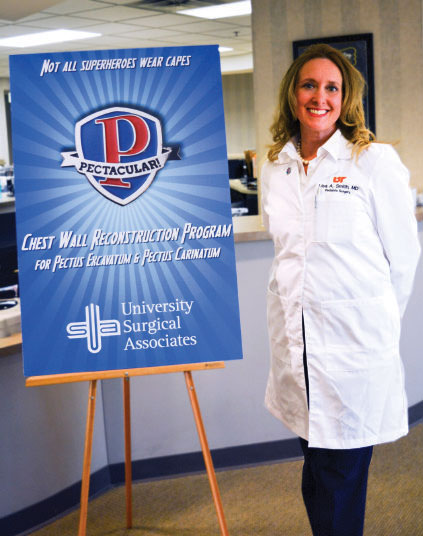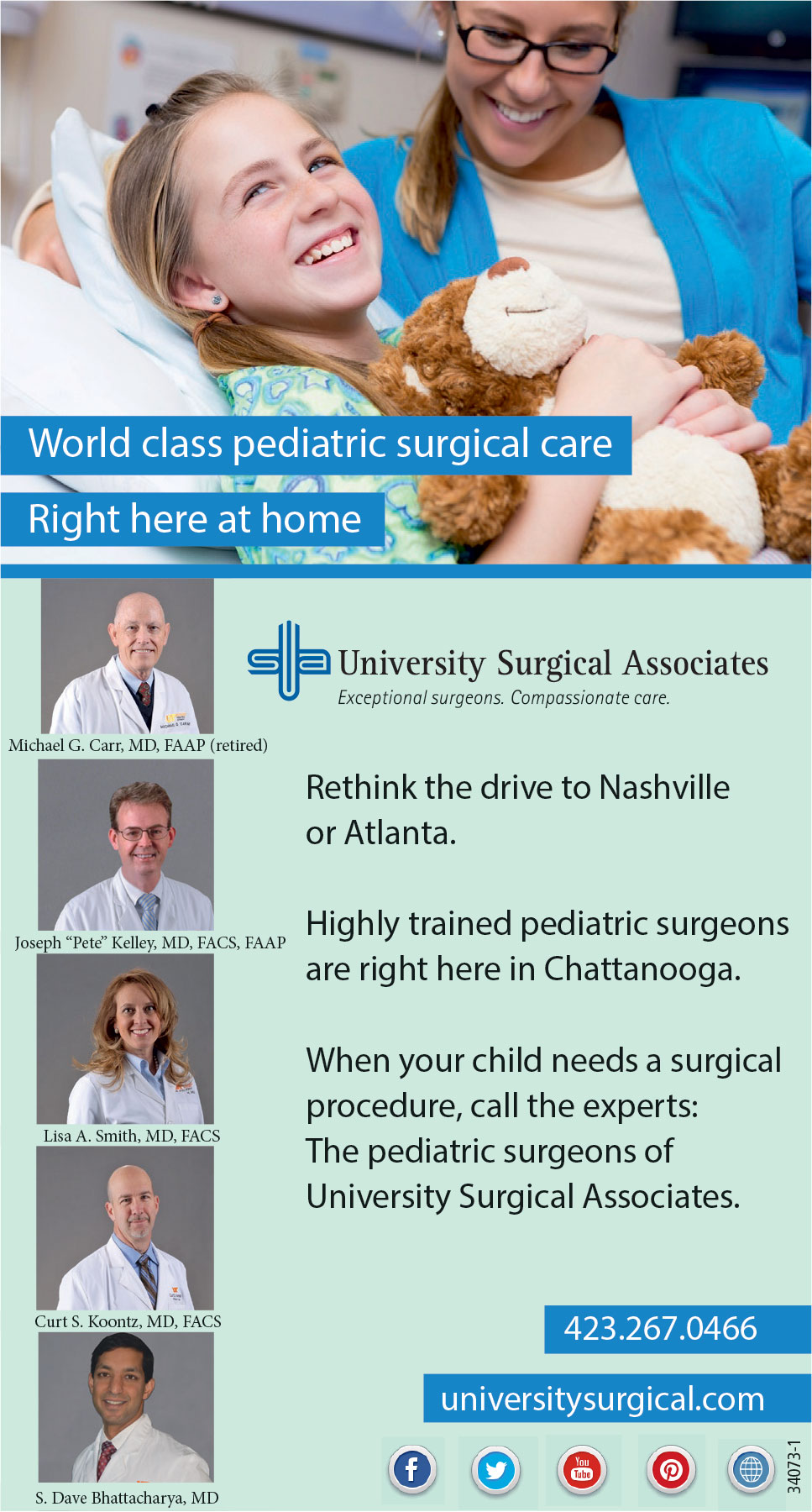When you're considering surgery for your child, you want the very best. Thankfully, you don't have to leave the Chattanooga area to find a highly skilled and experienced surgeon. Lisa Smith, MD with University Surgical Associates has 16 years of pediatric surgery experience and is the only surgeon performing minimally invasive chest wall reconstruction surgery in this region. She's cared for more than 800 children with chest wall deformities and has developed a revolutionary, team-based program which she calls Pectacular!
Chest wall deformities include a wide spectrum of disorders that range from severely sunken in to severely protruded – and every degree in between. Some deformities are obvious at birth, but they may not be apparent until a child is nine or 10 years old. One in 500 children (most commonly boys), are born with pectus excavatum – a congenital deformity where the chest cartilage grows abnormally, producing a caved-in appearance in the chest wall. A less common condition is pectus carinatum, where the chest bows outward rather than inward. This condition is nicknamed 'pigeon chest' and occurs in roughly one out 1,500 births.
The Pectacular! program at USA specializes in leading surgical procedures and non-surgical treatment for pediatric patients with chest wall deformities. The program guides patients and their families through pre-surgery educational sessions, pre-hab (a process that prepares the body through breathing exercises and strengthening key muscles), surgery, and follow-up care. It also connects them with a network of families who've been through the procedure and can answer questions and provide support.
"We understand that a parent's decision to seek treatment for their child is complex and involves the whole family," says Dr. Smith. "That's why our comprehensive program addresses the family's needs step by step. It connects patients with others who've already been through it and can see the positive impact on their child's life and health. Having those questions answered by other parents is invaluable to understanding how you can best encourage and care for your child."
Improving
Self-Esteem and Physical Health
Many children with chest wall deformities are self-conscious about their bodies, and that may be a driving force for pursuing treatment. But choosing to correct a chest wall deformity is about more than giving your child greater confidence in their physical appearance. In fact, it can greatly improve their physiological function in ways you might not expect.
"When your chest is deformed, it doesn't move like it should. You breathe differently, and it takes more energy to perform normal daily activities – causing children with the problem to fatigue more quickly," says Dr. Smith. "And when the sternum is pressing on the heart, it can't fill with blood properly. From a structural standpoint, chest wall reconstruction greatly improves a child's cardiac and pulmonary function. After recovery, most children can breathe more deeply and be active for longer periods of time than previously possible."
A Team Approach
University Surgical's Pectactular! program assembles the talented team of professionals who work together to provide the highest quality care for patient through every step of the process. This includes nurse practitioners, nurses, physical therapists, pain management specialists and anesthesiologists – all who are focused on providing the most advanced care and efficient recovery possible.
"I realize that as a surgeon, I'm only one factor in a child's surgery, rehabilitation, and full recovery – there's a supportive team that is invested in every patient's outcome, and that also includes the parents," says Dr. Smith. "Our team-based approach has resulted in decreased post-operative complications and improved pain control after surgery. It's also enhanced the recovery process – leading to happier patients and families."
Schedule a Consultation
Because it requires several months for a complete recovery, Dr. Smith performs most chest wall reconstruction procedures at the beginning of the summer when patients have an extended break from school and activities. To learn more about the Pectactular! program visit universitysurgical.com/pectacular or call 423-267-0466 to schedule an appointment.
Noteworthy:
"When your chest is deformed, it doesn't move like it should. You breathe differently, and it takes more energy to perform normal daily activities – causing children with the problem to fatigue more quickly," Dr. Lisa Smith.
MORE INFORMATION
To learn more about the Pectactular! program visit universitysurgical.com/pectacular or call 423-267-0466 to schedule an appointment.

